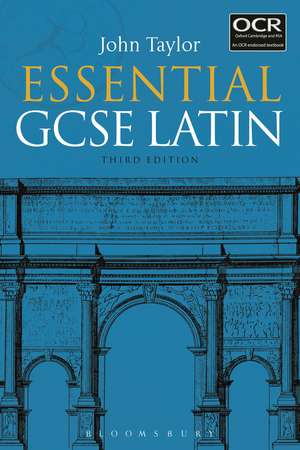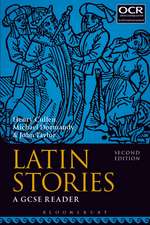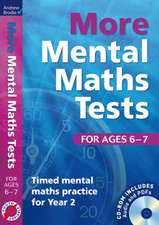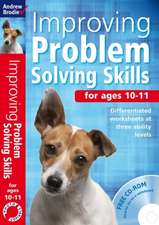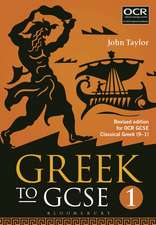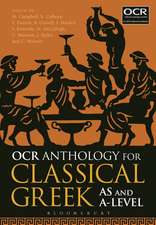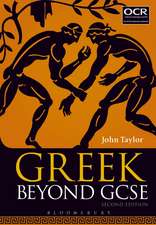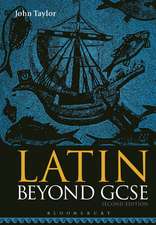Essential GCSE Latin
Autor Dr John Tayloren Limba Engleză Paperback – 9 aug 2017
Preț: 115.38 lei
Preț vechi: 124.16 lei
-7% Nou
Puncte Express: 173
Preț estimativ în valută:
22.08€ • 22.97$ • 18.23£
22.08€ • 22.97$ • 18.23£
Carte disponibilă
Livrare economică 24 martie-07 aprilie
Livrare express 07-13 martie pentru 33.71 lei
Preluare comenzi: 021 569.72.76
Specificații
ISBN-13: 9781350003804
ISBN-10: 1350003808
Pagini: 256
Dimensiuni: 156 x 234 x 14 mm
Greutate: 0.36 kg
Ediția:3
Editura: Bloomsbury Publishing
Colecția Bloomsbury Academic
Locul publicării:London, United Kingdom
ISBN-10: 1350003808
Pagini: 256
Dimensiuni: 156 x 234 x 14 mm
Greutate: 0.36 kg
Ediția:3
Editura: Bloomsbury Publishing
Colecția Bloomsbury Academic
Locul publicării:London, United Kingdom
Caracteristici
Breaks grammar down into bite-sized chunks, with examples and practice sentences (600 in all) on each point, and generous cross-referencing
Notă biografică
John Taylor was for many years Head of Classics at Tonbridge School, UK, and is now Lecturer in Classics at Manchester University, UK. He is an experienced examiner of Classical Greek and the author of Latin Beyond GCSE (2nd edition, Bloomsbury, 2017), and with Henry Cullen, the two-volume course Latin to GCSE (Bloomsbury, 2016).
Cuprins
PrefaceList of abbreviationsGlossary of grammar termsThe importance of word endingsNominative case; Vocative case; Accusative case; Genitive case; Dative case; Ablative caseDeclension and gender; First declension nouns; Second declension nouns; Third declension nouns; Fourth and fifth declension nounsAdjectives; Agreement of nouns and adjectives; Comparative adjectives; Superlative adjectives; Irregular comparative and superlative adjectivesAdverbs; Comparative and superlative adverbsPronouns; Personal pronouns; Possessives; This and That; Self and Same; Relative pronoun (who, which) and clause; Less common pronounsPrepositions; Prefixes and compound verbs; ConjunctionsVerbs and conjugations; Present tense; Imperfect tense; Future tense; Infinitive The verb to be; Principal parts; Perfect tense; Common irregular perfect tenses; Pluperfect tense; Future perfect tenseVery irregular verbs; Defective and impersonal verbsActive and passive; Present, imperfect and future passive; Agent and instrument; Perfect, pluperfect and future perfect passive; Passive infinitiveDeponent verbs; Semi-deponent verbsDirect commands; Direct questionsNumerals; Time expressions; Time clausesBecause and although clauses; If clauses (conditionals)Connecting relativePresent active participle; Perfect passive participle; Common irregular perfect passive participles; Perfect active participle (from deponent verbs); Future active participle; Disentangling participles; Ablative absolute; GerundivesIndirect statement; Imperfect subjunctive; Purpose clauses; Use of qui for purpose; Indirect commands; Result clauses; Verbs of fearing; Time clauses with imperfect subjunctive; Pluperfect subjunctive; Cum clauses; Indirect questionsNegativesTranslating complex sentencesImportant words with more than one meaningWords easily confusedSummary of uses of the subjunctivePractice passages for unseen translationVocabularyIndex
